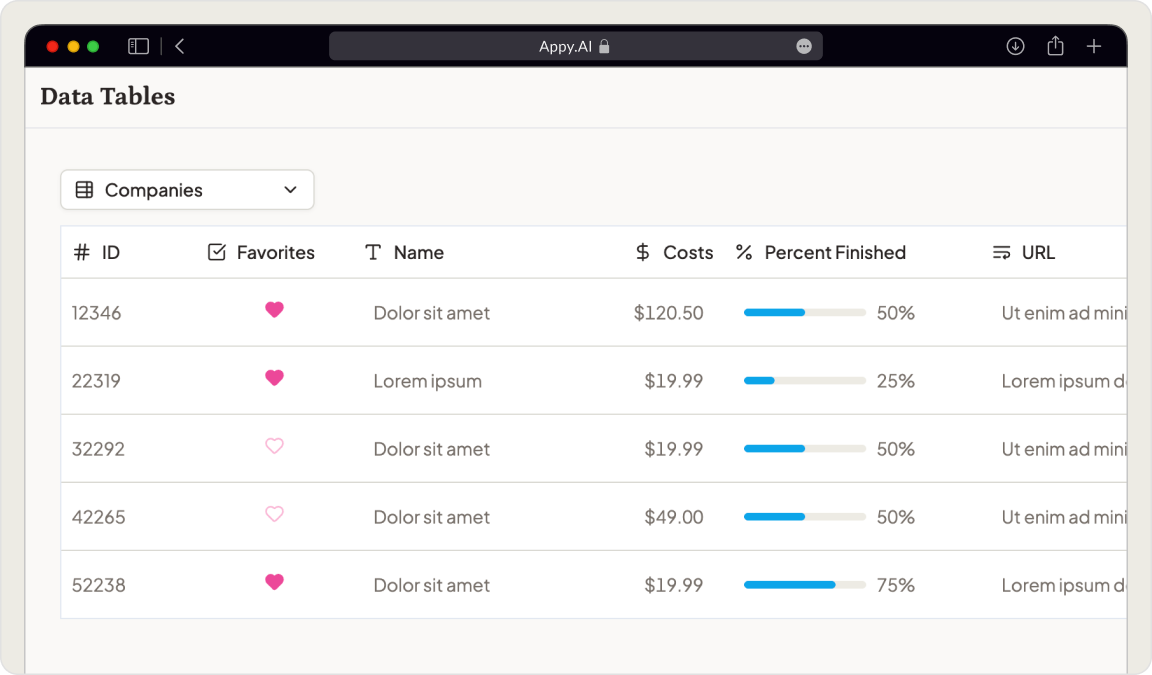Introducing: Databases
Create Notion-style databases that turn your agent into a real business application with structured data, visual tables, and optional customer editing capabilities—no technical skill required.

Turn Your Agent Into a Real Business Application
Your agent can chat. It can remember conversations. It can personalize responses.
But can it track inventory? Manage customer records? Monitor project status? Process orders?
Not without structured data. Not without a real database.
The Missing Piece of AI Business
Here's what nobody tells you about AI agents: Conversation alone doesn't run a business. You need data that persists, organizes, and powers actual workflows.
- Memory captures conversation patterns—great for continuity
- Preferences store user settings—perfect for personalization
- Databases manage business data—essential for real applications
Without databases, your agent is just a smart chatbot. With them, it's business software.
Notion-Simple, Enterprise-Powerful
Forget everything you fear about databases. No SQL. No schemas. No technical knowledge required.
Building a database in AppyAI feels exactly like creating a table in Notion:
- Familiar Fields: Choose from familiar options—text, numbers, currency, percentages, dates, checkboxes, URLs. Each type knows how to behave. Currency shows dollar signs. Percentages calculate correctly.
- Visual Configuration: Pick icons for visual clarity. Set colors for instant recognition. Format dates the way you prefer. Arrange columns in logical order. Your database looks professional without hiring a designer.
- Instant Intelligence: Your agent automatically understands your database structure. It knows which fields matter, how they relate, and what your customers need to see.
The Three Levels of Database Power
Level 1: Agent-Only Intelligence - Your database works behind the scenes. Customers never see tables—they just experience smarter interactions. The agent tracks their data invisibly, using it to provide better responses and recommendations.
Level 2: Read-Only Transparency - Toggle "Customers can view" and suddenly your agent includes data visualizations. Customers see their records, browse their history, understand their patterns. Trust increases when data is visible.
Level 3: Full Record Control - Enable "Customer can edit records" for true application functionality. Customers add new entries, update existing records, mark items complete, delete outdated data. Your agent becomes their business system.
Use Cases That Print Money
For Consultants: Track client projects with fields for deliverables, deadlines, status, and notes. Your agent becomes a lightweight project management system that actually gets used.
For Coaches: Monitor client goals with progress percentages, milestone dates, and achievement checkboxes. Sessions become data-driven and outcomes trackable.
For Agencies: Manage content calendars with post titles, publish dates, platforms, and performance metrics. Your agent orchestrates the entire content workflow.
For Course Creators: Track student progress through modules, assignments, quiz scores, and completion rates. Personalized learning paths based on actual data.
Beyond Simple Tables
Combine databases with other tools for compound applications:
- Database + Triggers: Update records automatically on schedule
- Database + Browser Use: Scrape competitor prices into tracking tables
- Database + Documents: Generate reports from live data
- Database + Email: Send summaries when records change
Your agent stops being a tool. It becomes the system of record.
The Data Hierarchy That Works
Understanding when to use each data type:
Memory = Behavioral patterns"This customer prefers formal language and detailed explanations"
Preferences = Configuration settings"Send reports weekly on Mondays to sarah@company.com"
Database = Business records"348 leads captured, 47 qualified, 12 converted, $284K pipeline value"
Each serves a purpose. Together, they create complete business solutions.
Five Minutes to Your First Database
- Navigate to Build → Database
- Click "Add Table" and name it
- Add columns with friendly names
- Choose appropriate field types
- Configure visibility and edit permissions
- Save and watch your agent get smarter
No database administrator needed. No technical documentation required. Just describe what you want to track, and build it.
From Chatbot to Business Platform
This changes everything about what you can build:
- Inventory trackers that know stock levels
- Booking systems that manage appointments
- Order processors that handle transactions
- CRM alternatives that actually work
- Project managers that teams use
- Learning platforms that track progress
Your imagination is the only limit.
Start Building Real Business Software
Your customers don't need another chatbot. They need solutions that manage real data, power real workflows, and drive real results.
Databases make that possible. Notion-simple interface makes it achievable. Your business vision makes it valuable.
Stop building toys. Start building tools that transform businesses.